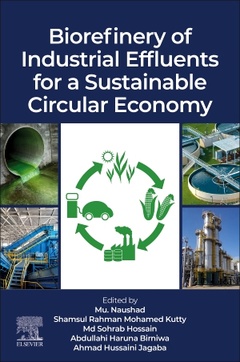Biorefinery of Industrial Effluents for a Sustainable Circular Economy
Coordonnateurs : Naushad Mu., Mohamed Kutty Shamsul Rahman, Hossain Sohrab, Birniwa Abdullahi Haruna, Jagaba Ahmad Hussaini

Biorefinery of Industrial Effluents for a Sustainable Circular Economy provides a combined approach on environmental engineering, which involves the improvement of the natural environment or remediation of polluted sites. In addition, it discusses bioprocess engineering involving the development of processes for the manufacture of products from biological materials to produce a valuable bioproduct. It covers sources, impacts, and applications of industrial effluents that could potentially be used as feedstock for the IEB with examples of applied research that demonstrates the relationship between the effluents, biorefinery, treatment and bioproduct recovery. Materials that can be produced from IEB and the treatment processes for such are considered.
1. Sources, generation, and properties of industrial effluents for utilization in a biorefinery M M Awad, Ahmed Ibrahim 2. Environmental impact and management of industrial effluents Shehu Habibu 3. Cleaner and sustainable circular economy approaches for bio-based product recovery from industrial effluents in a biorefinery Setyo Budi Kurniawan 4. Agro-industrial effluents: generation, characteristics, impacts, and applications for bio-based product recovery in a biorefinery Michael Kornaros 5. Food industrial effluents: generation, characteristics, impacts and applications for bio-based product recovery in a biorefinery Sameh Ali 6. Algae-based industrial effluents: generation, characteristics, impacts and applications for bio-based product recovery in a biorefinery Antonio Zuorro, Andrés Barajas-Solano 7. Municipal effluents: generation, characteristics, impacts, and applications for bio-based product recovery in a biorefinery Michael Kornaros 8. Aquaculture industrial effluents: Generation, characteristics, impacts, and applications for bio-based product recovery in a biorefinery Wei Chen, Zhanying Ye, Musa Abubakar Tadda, Songming Zhu, Abubakar Shitu 9. Palm oil mill effluents: generation, characteristics, impacts and applications for bio-based product recovery in a biorefinery Marhaini Mostapha, Najah Fareeha, Kushairi Mohd Salleh 10. Recent trends in pulp and paper effluents based biorefinery for bioenergy and value-added products formation Vineet Kumar 11. Sugarcane industry effluents: generation, characteristics, impacts and applications for bio-based product recovery in a biorefinery Sourja Ghosh 12. Sources, properties, and sustainable valorization technologies of agro-industrial effluents for bioproducts recovery in a biorefinery Sara Cuellar, Georgia Maria Gonzalez Meza 13. Microalgal and cyanobacterial strains for nutrients recovery and bio-based products synthesis from agro-industrial effluent Antonio Zuorro, Andrés Barajas-Solano 14. Physico-chemical processes for industrial effluents treatment in a biorefinery Sameh Ali 15. Role of membrane science in the sustainable development of an algal based biorefinery for industrial effluents treatment Dwaipayan Sen, Aparna Ray Sarkar 16. Biorefinery waste-based nanocomposites for industrial effluents treatment using physicochemical techniques Arnab Mukherjee, Debasis Dhak 17. Biological processes for industrial effluent treatment in a biorefinery Musa Abubakar Tadda 18. Recent advances in the sustainable application of biomass-based cellulose nanocrystals for industrial effluents treatment and resource recovery in biorefineries- Modelling and Optimization Olawumi SADARE, Oluwagbenga Abiola Olawuni, Kapil Moothi 19. Recent progress in the application of hybrid processes for industrial effluents treatment in biorefineries Md Bazlul Mobin Siddique 20. Techno-economic and life-cycle assessment of industrial effluents treatment in biorefineries Gaurav Saini, Anupriya Verma Anupriya 21. Valorization glycerol produced as a by-product in the biodiesel industry: An insight into technical and economic studies Tito Cadaval Jr 22. Ecological impact assessment of hazardous components of industrial effluents and their sustainable management obeying the principle of circular economy: An in-depth view Mousumi Basu 23. Current policy and regulatory challenges, opportunities, and future perspectives of industrial effluents treatment in biorefineries Sivarajasekar Natesan 24. Native microalgae consortia: a potential contribution to a biorefinery based on liquid circular inputs Montserrat Garcia-Solares 25. Comparative Study of Industrial Effluents for Biorefinery Conversion Imoh Attah
Dr. Mu. Naushad is working as a full professor in the Department of Chemistry, College of Science at King Saud University, Riyadh, Saudi Arabia. His research interests include wastewater treatment, adsorption, ion exchange, bioremediation, and photodegradation. Dr. Naushad is the author and coauthor of more than 500 refereed journal publications and several books, book chapters, and US patents.
Dr. Shamsul Rahman Mohamed Kutty is working as a professor in the Civil Engineering Department at the Universiti Teknologi PETRONAS (UTP), Malaysia. He received his PhD degree from the University of Memphis, TN, United States. He has worked with UTP for more than 20 years. Throughout the years, he has been involved in research and consultancies related to environmental management systems, water quality, wastewater treatment, and solid waste management for biogas generation.
Dr. Md. Sohrab Hossain is currently working as a senior lecturer in the Department of Fundamental and Applied Sciences at the Universiti Teknologi PETRONAS, Malaysia. Dr. Sohrab obtained his PhD degree in environmental technology from the Universiti Sains Malaysia. He has expertise in supercritical fluid technology, hazardous waste management, wastewater treatment, and waste to biofuel production.
Dr. Abdullahi Haruna Birniwa is working as a senior lecturer in the Department of Chemistry at Sule Lamido University, Kafin Hausa, Jigawa State of Nigeria. He[CE11] holds PhD degree in polymer chemistry from Bayero University, Kano and the University Malaya in Malaysia in 2019, MSc degree in color chemistry from Bayero University, Kano in 2013, and his BSc degree in applied chemistry from Usmanu Danfodiyo University, Sokoto in 2008.
[CE11]Please check the edits made in the sentence “He holds PhD degree in polymer chemistry …. for correctness and amend as necessary.
Dr. Ahmad Hussaini Jagaba is a postdoctoral fellow at the Interdisciplinary Research Centre for M
- Provides industrial effluents' source, characteristics, and treatment
- Assists in designing an optimization strategy for maximizing efficiency of waste treatment and of bioresource utilization in terms of economic, environmental, and social impact
- Explains bio-based product recovery for a bio-based economy
- Discusses advanced processes for simultaneous industrial effluents treatment and the generation of bio-based products of sufficient value
Date de parution : 10-2024
Ouvrage de 300 p.
15x22.8 cm



